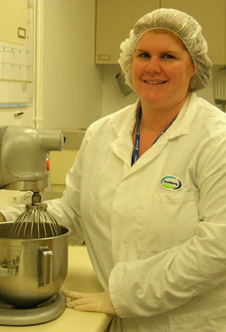
Lisa McClintock came to Otago to do medicine – as many young people do. Halfway through her first semester however, she realised that she really DIDN'T want to be a doctor, and she REALLY enjoyed the chemistry she'd been doing. So in her second semester she picked up a 200 level chemistry paper.
“I got to know my lecturers quite well quite quickly! Because I'd effectively skipped one of the 100 level papers, I didn't have all the background for the 200 level chemistry I was learning. There were a few gaps, and everyone was very helpful, answering all my questions.”
Instead of heading back to her hometown and studying Chemistry at Canterbury, Lisa stayed in Dunedin: she was captivated by the great lifestyle and the great support she'd received in the department during that second semester.
At the end of her BSc Honours she worked on a research project with Associate Professor Allan Blackman which she really enjoyed. She was keen to carry on with further study, and receiving a Top Achiever Doctoral Scholarship from the TEC (Tertiary Education Commission) clinched it.
“I was working in Inorganic Chemistry, making Cobalt(III) complexes - pretty colours and pretty crystals! The really cool thing about inorganic chemistry – apart from the pretty colours – is that you get to do a bit of everything really: you do lots of synthesis work, lots of hands-on practical stuff; organic chemistry making the ligands, inorganic chemistry making the complexes, physical chemistry studying the reaction rates of the complexes you've just created…”
Lisa joined Fonterra's graduate programme and spent the first eight months learning a lot about milk, as well as working on the factory floor, learning firsthand about production processes. Now she's working at the Fonterra Research Centre in Palmerston North as part of the Snacking and Convenience Team: Fonterra's dairy ingredients are used by food producers around the world, and Lisa's work looks at how those ingredients deliver in snack bars, energy bars and protein bars… can the ingredients be better, to deliver a better flavour or texture? Can they be used to make the end product healthier?
“What we're doing is quite new for Fonterra so it's really challenging. Everyone is very passionate about the company! Fonterra's so diverse, you can go just about anywhere. The graduate programme is really flexible, and it gives you a great network of people in the company and ultimately people in the industry worldwide. I think my PhD trained me to be a scientist. Now I'm applying those skills… I spend most of my time in a bakery now, rather than the lab!”